初中英语常用易混词汇辨析
初中英语词汇辨析30组

There are some new books on the desk. 桌子上有一些新书。 Would you like some water? (表征求、询问) 您来点儿水吗?
Are there any new books on desk? 桌子上有新书吗?
There isn’t any milk in the glass. 杯子里没有牛奶了。
词汇
用法
long before 很早以前;在……以前很久
before long 不久以后
8.alone / lonely
例句
He retired long before the war. 他在战争之前早就退休了。 Long before morning, all was done again. 天还没亮,一切又重新开始。 It won't be long before you regret what you have done. 过不了多久,你就会后悔你做的事。 Before long, we were deep in conversation. 我们很快就进入深谈。 I'll be seeing you before long. 不久,我就会见到你。 We'll see why before long. 我们不久后将看到为什么。
When did you get home / there / here?
12.agree with / agree on(upon) / agree to
词汇 agree with agree on (agree upon)
agree to
用法
例句
agree with sb. agree with sth.
(最新整理)初中英语常用易混词汇辨析
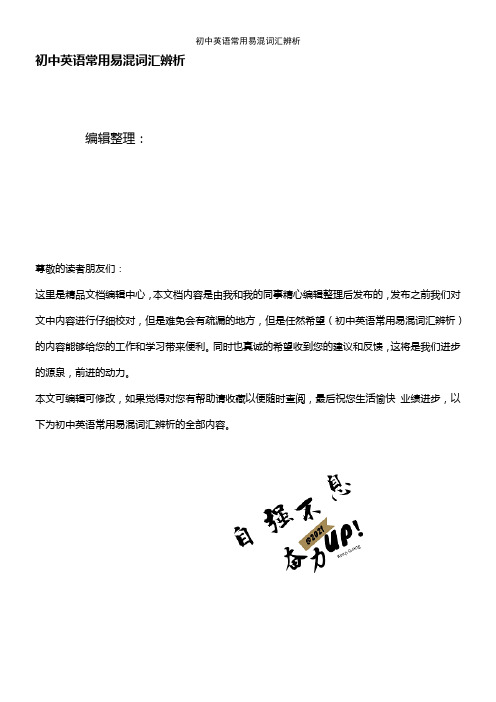
初中英语常用易混词汇辨析
已经到星期天啦?
通常用于疑问句和否定 I haven’t learned it yet。我还
句,在疑问句中意为“已 不知道此事。
yet
经”,在否定句中意为 Has he come yet?
“还,尚未”
他还没来吗?(表疑问)
answer/ reply
词汇 含义
用法
例句
He answered my question.
态;它也可放在“时间段”后, 我下午五点钟前到了那里。
用于完成时或一般过去时
I never saw him before。
我以前没见过他。
alone/ lonely
词汇
用法
一言辨义
“单独的”,只能作表语,强调 He lives alone, but he never
alone
数量单一
feels lonely.
le
杯子里有一些水。
ago/ before
词含
用法
例句
汇义
只用于一般过去时,表示从现 He died two years ago。
ago
在算起的一段时间以前
他是两年前去世的。
I got there before 5
以前 befo
re
后接“时间点”,可用于任何时 o’clock in the afternoon。
reach Beijing。 点名词作宾语
你到北京后请给我写信。
When did you get home
get
后 接 副 词 here, there,
yesterday?
to
home 时,要省略 to
你昨天什么时候到的家?
英语中考牢记20组易混易错词语辨析
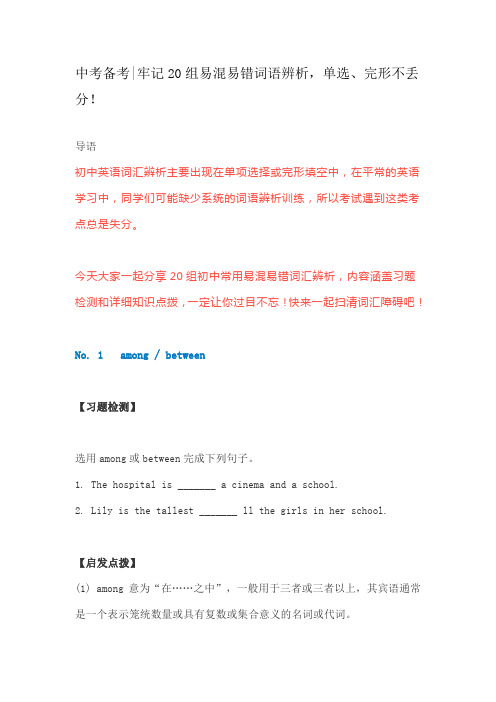
中考备考|牢记20组易混易错词语辨析,单选、完形不丢分!导语初中英语词汇辨析主要出现在单项选择或完形填空中,在平常的英语学习中,同学们可能缺少系统的词语辨析训练,所以考试遇到这类考点总是失分。
今天大家一起分享20组初中常用易混易错词汇辨析,内容涵盖习题检测和详细知识点拨,一定让你过目不忘!快来一起扫清词汇障碍吧!No. 1 among / between【习题检测】选用among或between完成下列句子。
1. The hospital is _______ a cinema and a school.2. Lily is the tallest _______ ll the girls in her school.【启发点拨】(1) among意为“在……之中”,一般用于三者或三者以上,其宾语通常是一个表示笼统数量或具有复数或集合意义的名词或代词。
(2) between一般指两者之间,其宾语通常是表示两者概念的名词或代词,或由and连接的两个具体的人或物。
between有时也可表示多者之中的“两两之间”。
如:Switzerland lies between France, Germany, Austria and Italy.Key:1. between2. amongNo. 2 lay / lie【习题检测】用lay或lie的适当形式完成句子。
1. I _______ the table when my mother cooked the meal.2. John was ill and _______ in bed all morning.【启发点拨】(1) lay作动词,可意为“摆放(餐桌)”,其过去式与过去分词均为laid,现在分词为laying,常用于短语lay the table,意为“摆放餐桌”。
如:Tom was laying the table.(2) lie作动词,意为“躺;平躺”时,过去式为lay,过去分词为lain,现在分词为lying。
初中英语300组常用词语辨析完整版

初中英语300组常用词语辨析Lesson495.bloom/flower/blossomⅠ.bloom指观赏用的花。
如:玫瑰;菊花;牡丹等。
Ⅱ.flower是普通用语。
Ⅲ.blossom指果树上的花。
96.boat/shipⅠ.boat“船、艇,”是普通用语。
主要指用浆、篙、帆或引擎的小船、小艇,但有时也指大轮船。
如:1We crossed the river by boat.我们乘船过河。
2They pulled the boat up on to the shore.他们把这条船拖上了岸。
(指小船③When does the boat leave for Shanghai?(指轮船Ⅱ.ship“船、舰,”多指大的航海船只。
如:1The ship is at sea.船厂在航海。
2They went to Guangahou by ship.他们乘船去广州。
97.bold/brave/courageousⅠ.bold“大胆的、勇敢的”着重指大胆、勇敢的气质,表现出有胆量、敢闯或敢于对抗而不畏缩。
如:1Be bold!勇敢些!2It’s very bold of us to v enture to go to sea.我们冒险航海是很勇敢的。
Ⅱ.brave“勇敢的”,应用最广泛,通常指在危险、困难或可怕的情况下表现勇猛而畏缩。
如:1Be brave!勇敢些!2It was brave of him to enter the burning building.他敢进入那燃烧着的房屋,真是勇敢。
Ⅲ.courageous“勇敢的,无畏的”表示由于有勇敢的气质或不屈不挠的精神而能无畏地自觉地对付某种事情,常常用于表示道义上的勇敢。
如:1He is courageous in telling the truth.他敢于讲实话。
2We hope that they will courageously shoulder their responsibilities and overcome all difficulties.我们希望能够勇敢地负起责任,克服一切困难。
初中英语核心词:易混词汇辨析

sad [sæd] a. (使人)悲伤的safe [seɪf] a.n. 安全的;保险柜safety [ˈseɪftɪ] n. 安全,保险There’s safety in numbers 人多势众sail[seɪl] n.v. 航行;航行;开航salad [ˈsæləd] n. 色拉(西餐中的一种凉拌菜);沙律sale [seɪl] n. 卖;出售salt [sɔːlt, sɔlt] n. 盐same [seɪm] n.a. 同样的事;同样的,同一的sand [sænd] n. 沙,沙子sandwich [ˈsænwɪdʒ] n. 三明治(夹心面包片)satisfy [ˈsætɪsfaɪ] n 满意,满足Saturday [ˈsætədɪ] n. 星期六save [seɪv] vt. 救,挽救,节省save one’s life 挽救某人的生命save one’s face 保全面子save the situation 挽回局势save one’s breath 保持沉默save time 节约时间save on 节约,节省We will save a lot of time if we go by car.我们要是乘汽车去可以节省很多时间。
say(said, said) [seɪ] vt. 说,讲go without saying 显而易见say to oneself 自言自语scarf[skɑːf] n. 领巾;围巾school [skuːl] n. 学校schoolbag['sku:lbæg] n. 书包science [ˈsaɪəns] n. 科学,自然科学scientist[ˈsaɪəntɪst] n. 科学家scissors [ˈsɪzəz] n. 剪刀score [skɔː(r)] n.&v. 得分;分数a score-keeper 记分员a score –sheet 记分单a score of 二十个screen [skriːn] n. 幕,荧光屏sea[siː] n. 海,海洋in the sea 在海里on the sea 在海滨by sea 乘船a sea of flames 一片火海search [sɜːtʃ] n.&v. 搜寻,搜查search for sb/sth 寻找某人/某物Rescue workers searched all night in the hope of finding more survivors.营救人员彻夜搜寻,希望找到更多的幸存者。
初中英语必背词语辨析20组
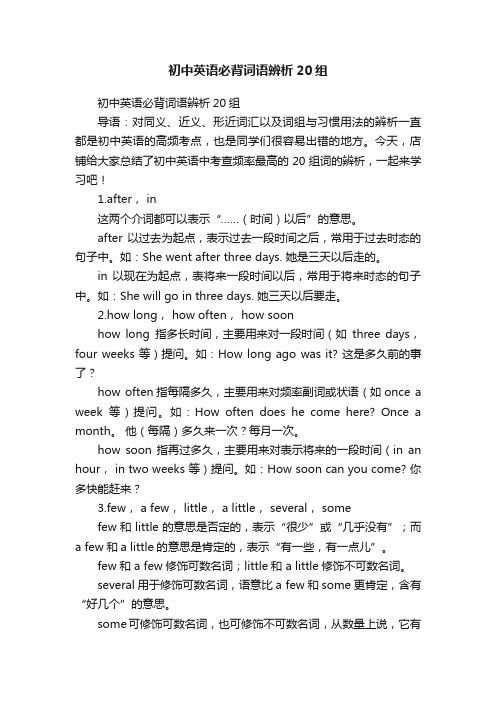
初中英语必背词语辨析20组初中英语必背词语辨析20组导语:对同义、近义、形近词汇以及词组与习惯用法的辨析一直都是初中英语的高频考点,也是同学们很容易出错的地方。
今天,店铺给大家总结了初中英语中考查频率最高的20组词的辨析,一起来学习吧!1.after, in这两个介词都可以表示“……(时间)以后”的意思。
after 以过去为起点,表示过去一段时间之后,常用于过去时态的句子中。
如:She went after three days. 她是三天以后走的。
in 以现在为起点,表将来一段时间以后,常用于将来时态的句子中。
如:She will go in three days. 她三天以后要走。
2.how long, how often, how soonhow long指多长时间,主要用来对一段时间(如three days,four weeks 等)提问。
如:How long ago was it? 这是多久前的事了?how often指每隔多久,主要用来对频率副词或状语(如once a week等)提问。
如:How often does he come here? Once a month。
他(每隔)多久来一次?每月一次。
how soon指再过多久,主要用来对表示将来的一段时间(in an hour, in two weeks 等)提问。
如:How soon can you come? 你多快能赶来?3.few, a few, little, a little, several, somefew和little的意思是否定的,表示“很少”或“几乎没有”;而a few和a little的意思是肯定的,表示“有一些,有一点儿”。
few和 a few修饰可数名词;little和 a little修饰不可数名词。
several用于修饰可数名词,语意比a few和some更肯定,含有“好几个”的意思。
some可修饰可数名词,也可修饰不可数名词,从数量上说,它有时相当于a few 或 a little,有时指更多一些的数量。
中考英语78个易混易错单词、短语、句型
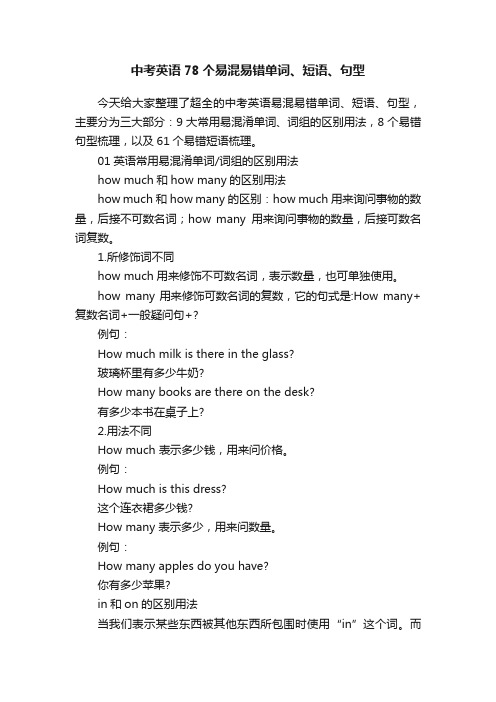
中考英语78个易混易错单词、短语、句型今天给大家整理了超全的中考英语易混易错单词、短语、句型,主要分为三大部分:9大常用易混淆单词、词组的区别用法,8个易错句型梳理,以及61个易错短语梳理。
01英语常用易混淆单词/词组的区别用法how much和how many的区别用法how much和how many的区别:how much用来询问事物的数量,后接不可数名词;how many用来询问事物的数量,后接可数名词复数。
1.所修饰词不同how much用来修饰不可数名词,表示数量,也可单独使用。
how many用来修饰可数名词的复数,它的句式是:How many+复数名词+一般疑问句+?例句:How much milk is there in the glass?玻璃杯里有多少牛奶?How many books are there on the desk?有多少本书在桌子上?2.用法不同How much 表示多少钱,用来问价格。
例句:How much is this dress?这个连衣裙多少钱?How many 表示多少,用来问数量。
例句:How many apples do you have?你有多少苹果?in和on的区别用法当我们表示某些东西被其他东西所包围时使用“in”这个词。
而“on”用于描述物体被放置在其他物体上方或外部的情况。
in可表时间,表地点,表手段、方法、材料。
on表示时间、地点、方位等。
1.意思不同in:prep.在 ... 里;在 ... 地方;在 ... 期间on:prep.在 ... 之上2.用法不同in:in着重一段时间的过程,常用于重复动作或延续动作。
in表示从现在时间算起推移到将来的一段时间之后,一般与将来时态连用。
例句:He is a layman in economics.他对经济学一窍不通。
on:表示“在物体的表面上”,只能用on的表达方式有on the next morning,on the following。
(完整)初中英语词汇辨析
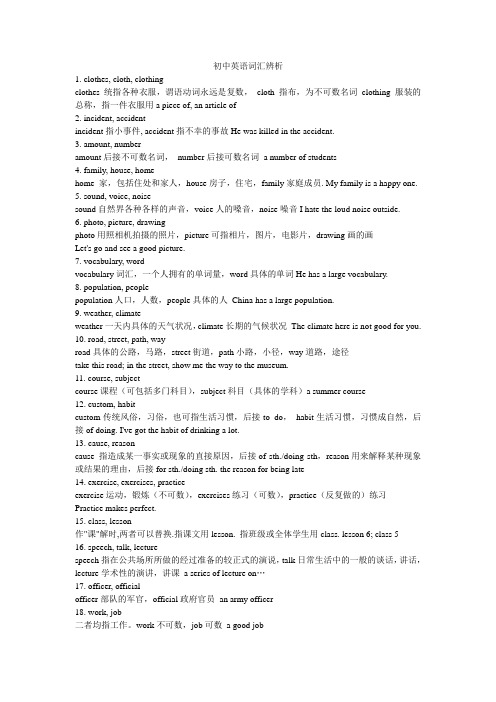
初中英语词汇辨析1. clothes, cloth, clothingclothes统指各种衣服,谓语动词永远是复数,cloth指布,为不可数名词clothing 服装的总称,指一件衣服用a piece of, an article of2. incident, accidentincident指小事件, accident指不幸的事故He was killed in the accident.3. amount, numberamount后接不可数名词,number后接可数名词a number of students4. family, house, homehome 家,包括住处和家人,house房子,住宅,family家庭成员. My family is a happy one.5. sound, voice, noisesound自然界各种各样的声音,voice人的嗓音,noise噪音I hate the loud noise outside.6. photo, picture, drawingphoto用照相机拍摄的照片,picture可指相片,图片,电影片,drawing画的画Let's go and see a good picture.7. vocabulary, wordvocabulary词汇,一个人拥有的单词量,word具体的单词He has a large vocabulary.8. population, peoplepopulation人口,人数,people具体的人China has a large population.9. weather, climateweather一天内具体的天气状况,climate长期的气候状况The climate here is not good for you.10. road, street, path, wayroad具体的公路,马路,street街道,path小路,小径,way道路,途径take this road; in the street, show me the way to the museum.11. course, subjectcourse课程(可包括多门科目),subject科目(具体的学科)a summer course12. custom, habitcustom传统风俗,习俗,也可指生活习惯,后接to do,habit生活习惯,习惯成自然,后接of doing. I've got the habit of drinking a lot.13. cause, reasoncause 指造成某一事实或现象的直接原因,后接of sth./doing sth,reason用来解释某种现象或结果的理由,后接for sth./doing sth. the reason for being late14. exercise, exercises, practiceexercise运动,锻炼(不可数),exercises练习(可数),practice(反复做的)练习Practice makes perfect.15. class, lesson作"课"解时,两者可以替换.指课文用lesson. 指班级或全体学生用class. lesson 6; class 516. speech, talk, lecturespeech指在公共场所所做的经过准备的较正式的演说,talk日常生活中的一般的谈话,讲话,lecture学术性的演讲,讲课a series of lecture on…17. officer, officialofficer部队的军官,official政府官员an army officer18. work, job二者均指工作。
中考易拼错单词

中考易拼错单词
一、accommodation [əˌkɒməˈdeɪʃn],名词。
1. 含义:住宿;膳宿。
2. 易错点:容易少写一个“m”或者把“c”和“m”的顺序弄混。
二、embarrassed [ɪmˈbærəst],形容词。
1. 含义:感到尴尬的;难堪的。
2. 易错点:容易写成“embarrass”(动词)或者拼写时少字母,如写成“embarased”。
三、separate。
- 作动词 [ˈsepəreɪt]:分离;分开。
- 作形容词 [ˈseprət]:单独的;分开的。
1. 易错点:作动词时,容易忘记“a”后面的“r”;作形容词时,容易与动词形式混淆。
四、believe [bɪˈliːv],动词。
1. 含义:相信;认为。
2. 易错点:容易写成“beleive”,将“ie”顺序弄反。
五、receive [rɪˈsiːv],动词。
1. 含义:收到;接到。
2. 易错点:容易写成“recieve”,把“ei”顺序写错。
六、necessary [ˈnesəsəri],形容词。
1. 含义:必要的;必需的。
2. 易错点:容易写成“neccessary”,多写一个“c”。
七、government [ˈɡʌvənmənt],名词。
1. 含义:政府。
2. 易错点:容易写成“goverment”,少写一个“n”。
初中易混词汇辨析
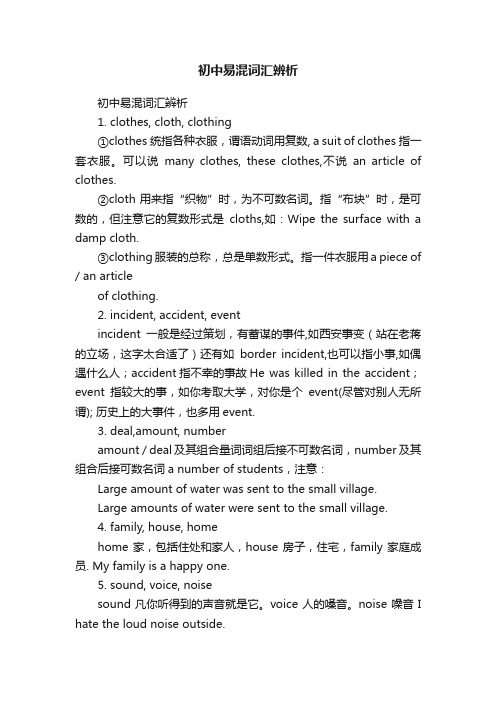
初中易混词汇辨析初中易混词汇辨析1. clothes, cloth, clothing①clothes统指各种衣服,谓语动词用复数, a suit of clothes指一套衣服。
可以说many clothes, these clothes,不说an article of clothes.②cloth 用来指“织物”时,为不可数名词。
指“布块”时,是可数的,但注意它的复数形式是cloths,如:Wipe the surface with a damp cloth.③clothing服装的总称,总是单数形式。
指一件衣服用a piece of / an articleof clothing.2. incident, accident, eventincident一般是经过策划,有蓄谋的事件,如西安事变(站在老蒋的立场,这字太合适了)还有如border incident,也可以指小事,如偶遇什么人;accident指不幸的事故He was killed in the accident;event指较大的事,如你考取大学,对你是个event(尽管对别人无所谓); 历史上的大事件,也多用event.3. deal,amount, numberamount / deal及其组合量词词组后接不可数名词,number及其组合后接可数名词a number of students,注意:Large amount of water was sent to the small village.Large amounts of water were sent to the small village.4. family, house, homehome家,包括住处和家人,house房子,住宅,family家庭成员. My family is a happy one.5. sound, voice, noisesound凡你听得到的声音就是它。
初中英语常见词汇辨析

初中英语常见词汇辨析英语近义词辨析1.辨析:such和so:二者都表示程度,“如此;这样”,其区别为:注意:“such+a/an +adj+可数名词单数形式”可与“so+adj+a/an+可数名词单数形式”转换。
She is such a kind girl.=She is so kind a girl.2.each和every注意:each不能与almost,nearly及not搭配使用,而every可以。
Almost every window was broken.Not every student went on holiday.Each不能用于否定句,在否定句中应用none。
None of the books are mine.3.alone与lonelyShe was alone in the dark room.她独自一人呆在那间黑暗的屋子里。
He lives alone but he doesn't feel lonely.他独自生活,但并不感到孤独。
It's a lonely beach.那是一个人迹罕至的海滩。
4.stop doing sth与stop to do sth.One of +可数名词复数:……之一,做主语时,谓语动词要用单三形式。
12/ 1初中英语常见词汇辨析English is one of my favorite subjects.One of my friends knows you.5.few,a few与little,a littleThere are few eggs on the plate,so I must buy some.盘子里没几个鸡蛋了,所以我必须买一些There are a few eggs on the plate,so I needn't buy any at once.There's little milk in the glass.杯子里没多少牛奶了。
初中英语易混淆的词语辨析

初中英语易混淆的词语辨析第一组spend/take/cost① 花费的主题通常是“人”,即“某人花费了多少时间或金钱”例句:2)shespentlotsofmoneyonbookslastyear.(去年她花费很多钱在书本上。
)② 做某事需要多长时间1)howlongdoesittakeyoutofinishthework?(你需要多少时间才能完成那工作?)2)ittookmeanhourtorepairmybike.(我花了一个小时修理自行车。
)3)这让我们有足够的时间去了解真相。
说实话需要很大的勇气③cost的主语通常是事物,即指①某物值多少钱②需要多少时间③某人花了多少钱④使(某人)(丧失)(事/物)+cost+(人)+时间/金钱1)thewatchcostmetwohundredyuan.(这块手表花了我200块钱。
)2)写小说要花很多时间。
写小说要花很多时间3)thegirl'sbadbehaviorcostherparentsmanysleeplessnights.(那个女孩的不良行为使得她的父母许多夜晚睡不着。
)注意:cost的过去式,过去分词都是cost。
第二组:说/说/说/说①speak说某种语言,说某人好、坏话是及物动词;发表讲话,对某人说话,是不及物动词。
1)thestudentsspeakenglishveryfluently.(这些学生英语说得非常流利。
)2)总理就国际形势发表了讲话。
(首相就国际形势发表了讲话。
)3)她总是会说话。
她总是说别人的坏话② 一般来说,坦率地说,坦率地说,严格地说,严格地说,不说;更不用说1)generallyspeaking,manisstrongerthanwoman.(一般而言,男人比女人强壮。
)2)我们会说英语,不会说汉语。
我们能读英语,更不用说中文了④say说出某句话或某件事;后接从句,(但say与从句之间不能直接接人称代词或名词);说明时间;书信、布告报纸上的“说”,习惯用法1)shesaid,“iloveyou.”(她说:“我爱你。
2021年初中英语人教版易混易错词汇辨析
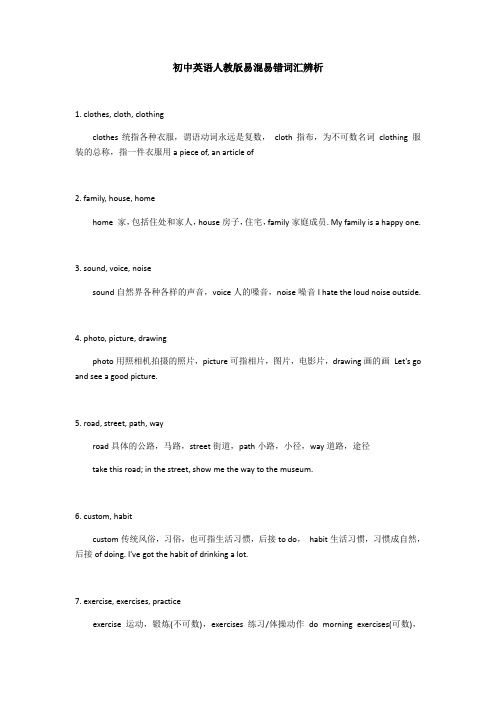
初中英语人教版易混易错词汇辨析1. clothes, cloth, clothingclothes统指各种衣服,谓语动词永远是复数,cloth指布,为不可数名词clothing 服装的总称,指一件衣服用a piece of, an article of2. family, house, homehome 家,包括住处和家人,house房子,住宅,family家庭成员. My family is a happy one.3. sound, voice, noisesound自然界各种各样的声音,voice人的嗓音,noise噪音I hate the loud noise outside.4. photo, picture, drawingphoto用照相机拍摄的照片,picture可指相片,图片,电影片,drawing画的画Let's go and see a good picture.5. road, street, path, wayroad具体的公路,马路,street街道,path小路,小径,way道路,途径take this road; in the street, show me the way to the museum.6. custom, habitcustom传统风俗,习俗,也可指生活习惯,后接to do,habit生活习惯,习惯成自然,后接of doing. I've got the habit of drinking a lot.7. exercise, exercises, practiceexercise运动,锻炼(不可数),exercises练习/体操动作do morning exercises(可数),practice(反复做的)练习Practice makes perfect.8. class, lesson作"课"解时,两者可以替换.指课文用lesson. 指班级或全体学生用class. lesson 6; class 59. speech, talk, lecturespeech指在公共场所所做的经过准备的较正式的演说,talk日常生活中的一般的谈话,讲话,lecture学术性的演讲,讲课 a series of lecture on…10. officer, officialofficer部队的军官,official政府官员an army officer11.work, job 二者均指工作。
初中英语常见易混词汇辨析

初中英语常见易混词汇辨析在初中英语的学习中,同学们常常会遇到一些容易混淆的词汇,这些词汇在拼写、发音、词义或用法上有相似之处,给我们的理解和运用带来了一定的困难。
下面就为大家详细辨析一些常见的易混词汇。
一、“a”和“an”“a”和“an”都属于不定冠词,用于泛指一个人或事物。
“a”用于以辅音音素开头的单词前,“an”用于以元音音素开头的单词前。
需要注意的是,这里所说的“元音音素”和“辅音音素”指的是读音,而不是字母。
例如,“a book”(一本书),“an apple”(一个苹果)。
“hour”(小时)这个单词虽然以“h”开头,但“h”不发音,它的读音是以元音音素开头,所以应该说“an hour”。
二、“alone”和“lonely”“alone”表示“独自的,单独的”,侧重于指客观上的独自一人,没有同伴。
“lonely”则表示“孤独的,寂寞的”,侧重于指主观上感到孤独、寂寞,带有感情色彩。
例如,“He lives alone but he doesn't feel lonely”(他独自生活,但并不感到孤独。
)三、“bring”和“take”“bring”意为“带来,拿来”,指把某物从别处带到说话者所在的地方。
“take”意为“拿走,带走”,指把某物从说话者所在的地方带到别处。
例如,“Bring your book here”(把你的书带到这儿来。
)“Take this bag to your room”(把这个包拿到你的房间去。
)四、“in front of”和“in the front of”“in front of”表示“在……前面”,指在某个物体外部的前面。
“in the front of”也表示“在……前面”,但指在某个物体内部的前面。
例如,“There is a tree in front of the house”(房子前面有一棵树。
)“The driver is sitting in the front of the bus”(司机坐在公共汽车的前部。
关于初二英语易混词语辩析

关于初二英语易混词语辩析我们的初中生平常英语学习有没有积累一些错题历史总结,接下来,小编给大家准备了关于初二英语易混词语辩析,欢迎大家参考与借鉴。
关于初二英语易混词语辩析1. day , dateday 和date 这两个单词都与“日子”有关。
day 表示“日子,天”时,通常是指“某一天”的意思,它还含有“节日,假日,生日”的意思。
例如:He works1 eight hours a day. (他一天工作 8 个小时。
)They stayed in Beijing for three days. (他们在北京呆了 3 天。
) day 还可以表示“天气”。
例如:What a fine day! (多好的天气啊!)而 date 通常用来指“日期,时日,年代”等,它不仅包括一般的年、月中的“日期”,而且还可以指历史上的某一“年代”或“日期”。
例如:I don't know the date of the football match. (我不知道那场足球赛的具体日期。
)Please put a date on the letter. (请在信上写明日期。
)The date of her birth is November 18, 1989. (他出生于 1989 年 11 月 18 日。
)2. real, truereal 和 true 均表示“真的”的意思,都用作形容词,但 real 指客观存在的、并非想像或仿照的“真的,真正的”,其副词形式为really .例如:Is this real gold? (这是真金吗?)This is a story of real life. (这是现实生活中的一个故事。
)I really don't know what to do next. (我真地不知道下一步该怎么办。
)true 意为“真的,真实的”,它表示的“真实的,确实的”是和客观事实相一致的,并非杜撰、捏造的;其副词形式为 truly2 .例如:What he said is true. (他说的是真的。
初中英语常见词汇辨析

英语近义词辨析注意:“such+a/an +adj+可数名词单数形式”可与“so+adj+a/an+可数名词单数形式”转换。
She is such a kind girl.=She is so kind a girl.2.each和every注意:each不能与almost,nearly及not搭配使用,而every可以。
Almost every window was broken.Not every student went on holiday.Each不能用于否定句,在否定句中应用none。
None of the books are mine.H e lives alone but he doesn’t feel lonely.他独自生活,但并不感到孤独。
I t’s a lonely beach.那是一个人迹罕至的海滩。
4.stop doing sth与stop to do sth.English is one of my favorite subjects.One of my friends knows you.There are few eggs on the plate,so I must buy some.盘子里没几个鸡蛋了,所以我必须买一些There are a few eggs on the plate,so I needn’t buy any at once. There’s little milk in the glass.杯子里没多少牛奶了。
There’s a little milk in the glass.杯子里有一点牛奶。
我们班上任何人都知道这些歌手中的任何一个和他们歌曲中的任何一首。
这类形容词:interest和interesting、excited和exciting、surprised和surprisingThe boy was very excited when he heard the exciting news.Try做vi,意为“尝试、努力”I don’t think I can do it ,but I‘ll try.Try:做名词,”尝试”,have a try.“试一试”11.作“花费”:cost/spend/take /payI spent 200 yuan on a new coat.Don’t spend too much time watching TV.The dictionary cost me 89 yuan.It took Mr. Green an hour to finish his work yesterday.I paid 15 yuan for the pen .12.Through over acrossIt began to rain.However,we went out to look for the boy. You may be right but I don’t believe you.None of us went to the park.No one wants to leave.——who like that place?>——no one.Jim was writing a letter when I came in.另外,while 还可意为“而;然而”,表示两种情况的对比。
初中英语常用词语辨析完整版
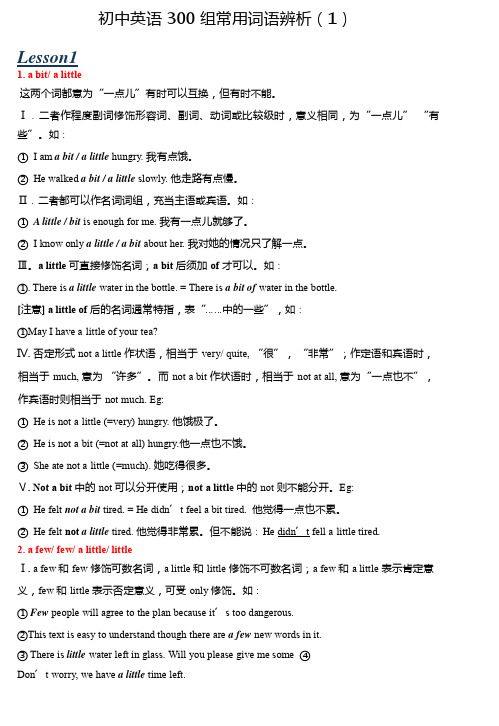
初中英语 300 组常用词语辨析(1)Lesson11. a bit/ a little这两个词都意为“一点儿”有时可以互换,但有时不能。
Ⅰ.二者作程度副词修饰形容词、副词、动词或比较级时,意义相同,为“一点儿”“有些”。
如:①I am a bit / a little hungry. 我有点饿。
②He walked a bit / a little slowly. 他走路有点慢。
Ⅱ.二者都可以作名词词组,充当主语或宾语。
如:①A little / bit is enough for me. 我有一点儿就够了。
②I know only a little / a bit about her. 我对她的情况只了解一点。
Ⅲ。
a little 可直接修饰名词;a bit 后须加of 才可以。
如:①. There is a little water in the bottle. = There is a bit of water in the bottle.[注意]a little of后的名词通常特指,表“……中的一些”,如:①May I have a little of your tea?Ⅳ. 否定形式 not a little 作状语,相当于very/ quite, “很”,“非常”;作定语和宾语时,相当于much, 意为“许多”。
而not a bit 作状语时,相当于not at all, 意为“一点也不”,作宾语时则相当于not much. Eg:①He is not a little (=very) hungry. 他饿极了。
②He is not a bit (=not at all) hungry.他一点也不饿。
③She ate not a little (=much). 她吃得很多。
Ⅴ. Not a bit中的not 可以分开使用;not a littl e 中的not 则不能分开。
Eg:①He felt not a bit tired. = He didn’t feel a bit tired. 他觉得一点也不累。
- 1、下载文档前请自行甄别文档内容的完整性,平台不提供额外的编辑、内容补充、找答案等附加服务。
- 2、"仅部分预览"的文档,不可在线预览部分如存在完整性等问题,可反馈申请退款(可完整预览的文档不适用该条件!)。
- 3、如文档侵犯您的权益,请联系客服反馈,我们会尽快为您处理(人工客服工作时间:9:00-18:30)。
初中英语常用易混词汇辨析汇用法例句above“在……上方”,不一定含有垂直在上的意思。
反义词为:belowThe sun rose above the horizon、太阳升到了地平线以上。
over“在……上面”,含有垂直在上的意思There is a bridge over the river、河上有座桥。
o n“在……上面”,含有与表面相接触的意思There is an oil painting on the wall、墙上有一幅油画。
across/through 词汇用法例句across“横过,穿过”,指从……的一边到另一边Be careful when you walk across the road、当你过马路的时候要小心。
through “穿过”,强调从内部穿过The river flows throughthe city from west to east、这条河从西到东流过城市。
atall/ after all 词汇用法例句at all“全然,根本不”,一般用于否定句中加强语气She doesn’t like football at all、她一点也不喜欢足球。
a fter all“毕竟,终究,到底”,一般置于句首或句末作状语After all, he is a child、毕竟,他还是个孩子。
f ew / a few / little / a little 词汇含义修饰名词肯定/否定例句few几乎没有可数否定I am a new comer here, so I have few friends here、我刚来到这里,所以我在这里没有几个朋友。
a few有一些肯定Though the man has been here for only one month, he has a few friends、尽管这个人才在这里住了一个月,但他就有了一些朋友。
l ittle几乎没有不可数否定There is little water in the glass, so you can’t drink any、杯子里几乎没有水了,你不可能喝到水了。
alittle有一些肯定There is a little water in the glass、杯子里有一些水。
a go/ before词汇含义用法例句ago以前只用于一般过去时,表示从现在算起的一段时间以前He died two years ago、他是两年前去世的。
b efore后接“时间点”,可用于任何时态;它也可放在“时间段”后,用于完成时或一般过去时I got there before5 o’clock in the afternoon、我下午五点钟前到了那里。
I never saw him before、我以前没见过他。
a lone/ lonely词汇用法一言辨义alone“单独的”,只能作表语,强调数量单一He lives alone, but he never feels lonely、他独自一人生活着,但是他从不感到寂寞。
lonely“孤独的,寂寞的”,强调心理感受already/ yet 词汇含义用法例句 already已经常用于肯定句,多与完成时和进行时连用。
用于疑问句时表示问话人持怀疑、惊异的态度I have already finished it、我已经做完了。
I s it Sunday already?已经到星期天啦?yet通常用于疑问句和否定句,在疑问句中意为“已经”,在否定句中意为“还,尚未”I haven’t learned it yet、我还不知道此事。
Has he come yet?他还没来吗?(表疑问) answer/ reply词汇含义用法例句answer回答,答复它可以用作及物动词或不及物动词He answered my question、他回答了我的问题。
It is a difficult question to answer、这是一个难以回答的问题。
reply常用作不及物动词,回答某人或某事,后接to I didn’t reply to him、我没有答复他。
a rrive /reach/get to词汇含义用法例句 arrive到达是不及物动词,arrive + in + 大地方(国家、城市等); arrive + at + 小地方(村庄、车站、码头等)He arrived in Nanning last week、他上星期来到南宁。
r each是及物动词,后直接跟地点名词作宾语Please write to me when you reach Beijing、你到北京后请给我写信。
get to后接副词here,there,home时,要省略to When did you get home yesterday?你昨天什么时候到的家?agree with/ agree on/ agree to 词汇用法例句agree with表示“与……意见一致”I don’t agree with you、我不同意你的意见。
a gree on表示“双方就……达成一致协议” China and the U、S、A、 agreed on the place and time for the next meeting、中美双方就下次会议的时间、地点问题达成了一致。
a gree to表示“同意,认同”,宾语一般为“计划、安排”We all agreed to your plan、我们都同意你的计划。
a little/ abit 词汇相同点不同点例句a little表示“一点儿”,都可修饰形容词、副词及其比较级,也可修饰动词a little后可直接接不可数名词,a bit若修饰不可数名词必须用a bit ofGet up a bit/ a little earlier, and you will see the star、起早一点你就会看到那位明星了。
a bitHe ate a little / a bit offood this morning、他今天早上就吃了一点食物。
a s/like词汇含义用法例句as像作介词,意为“以……的身份;作为” She works as an interpreter in that company、她在那个公司里担任翻译员。
l ike作介词,意为“像(如同)……一样,如……般的” It’s not like you to take offense、你不像会发脾气的人。
after/in词汇含义用法例句after在……之后以过去为起点,表示过去一段时间之后,常用于过去时态的句子中She went after three days、她是三天以后走的。in以现在为起点,表将来一段时间以后,常用于将来时态的句子中 She will go in three days、她三天以后要走。by the way/on the way/in the way 词汇用法例句by the way常用作状语,意为“顺便问一下,顺便说一下” By the way, how old are you?顺便问一下,你多大了?on the way“在……的路上”,后接名词时需加介词to He bought a pen on his/the way to school、他在上学的路上买了一支钢笔。
i n the way“挡路;妨碍” Your car is in the way、你的小汽车挡路了。
because/because of 词汇含义用法例句because因为是连词,其后接句子He didn’t come because he was ill、因为病了,他没来。
because of是复合介词,其后接名词、代词、动名词、what从句等We have to put off the meeting because of the bad weather、因为天气不好,我们不得不推迟会议。
be afraid that/be afraid of词汇用法例句be afraid that如果后接宾语从句,意为“恐怕……”,用来表示带有歉意的回话或引出令人不满意的消息I’m afraidI can’t help you、我恐怕帮不了你的忙。
b e afraid of后接名词/代词/动名词,意为“害怕做某事” I am afraid of going out at night、我害怕晚上出去。
big/large/great/ huge 词汇用法例句big侧重于表示物体的块头、重量,含有庞大、笨重的意思,其反义词是little This coat is too big for her、这件上衣对她来说太大了。
l arge侧重表示物体的宽度和数量,有广阔和众多的含义,其反义词是small China is a large country、中国是一个幅员辽阔的国家。
great常表示“伟大的”,带有一定的感情色彩Einstein is a great scientist、爱因斯坦是位伟大的科学家。
huge表示“巨大的;极大的”,修饰具体事物,指规格数额超常The earth is a huge ball、地球是一个巨大的球。
below/under 词汇含义用法例句below在……的下面所指范围较广,不一定在某物的正下方,其反义词是aboveFromthetopofthemountain,wecouldseethewholevillagebelowus、从山顶上,我们可以看见下面乡村的全貌。
under所指范围较窄,往往表示在某物的正下方,其反义词是overThereisacatunderthetable、桌子底下有只猫。
between/ among 词汇含义用法例句between在……之间用于表示双方之间的关系There is a tree between the two houses、这两座房子之间有一棵树。
among用于表示三个或三个以上之间的关系London is among the greatest cities of the world、伦敦是世界上最大的城市之一。
another/ the other/ other/ others/ the others 词汇用法例句another指不定数目中的“另一个,又一个” I don’t think the coat is good enough、 Can you show me another one ? 我认为这件上衣不够好。
你能给我看另一件吗?the other指两个中的“另一个” He has two sons, one is in Shanghai, the other is in Beijing、他有两个儿子,一个在上海,另一个在北京。
